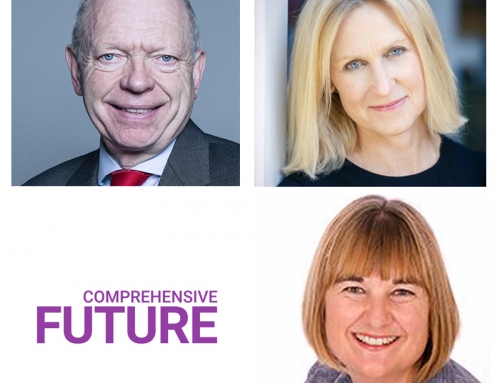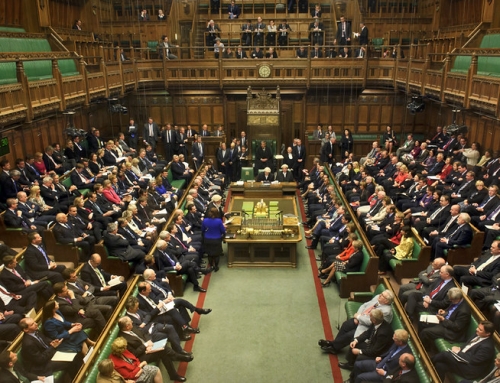Conference November 21st 2015
Part 3 Is comprehensive education under threat ? What should be done to defend it?
Dame Sue John was formerly Headteacher of Lampton School, a National Teaching School. She has held directorships at the DFE, Future Leaders and Teaching Leaders and is currently Executive Director at Challenge Partners in addition to her role as secondary Director of the London leadership Strategy. Unfortunately Dame Sue was unable to attend because of illness but kindly sent her notes for inclusion in the report.
I think that it is somewhat apt that we are meeting in Westminster because surely the success of London schools is a testimony to the comprehensive ideal. London, largely through the comprehensive system – there are in fact only a handful of grammar schools across the capital city – is still the highest performing region in the country -four years after the end of the city challenge period. That is not to say that the job is done! The one thing that has not changed during this period is the small number of children going to selective schools despite a rise in the school population.
In 2002 London was the poorest performing region and there have been countless reports attributing the success of London to many factors – with just about everybody claiming credit for the improvement. As a HT actively involved in leading the school to school work across the secondary sector I do believe that practitioners, aligned to politicians and policy makers of the day were instrumental in shifting the school culture in London from one of extreme competition and an inward looking mentality towards a collaborative and knowledge sharing environment.
Approximately 400 schools in London operate in a largely non selective environment. It is our responsibility as head teachers to raise the performance of all students, whatever their starting points and in effect to close gaps.
HTs across the country are now running Teaching Schools, leading MATS or are engaged in other collaborative organisations. They have managed to reconcile the interests of their own schools with the imperative to take responsibility for the success of children being educated beyond their school gates in the wider community.
A great deal of trust is being built up within the education system and the importance of raising standards for ALL is a common mantra.
There is a real danger if grammar schools expand further that these collaborative working practices will come under threat. Schools will retreat in order to compete. This could lead to a regression for the benefit of the few with a negative impact on the majority.
I have been particularly fortunate to lead a very diverse and comprehensive school in Hounslow over the past 18 years – Tim Brighouse once referred to the school as being the most diverse he had visited in terms of social mix, ethnicity, religion and ability.
It is possible in such a context to have both excellence and equity – It is a matter of principled leadership – having high expectations of all students and offering a challenging and ambitious curriculum with fantastic teaching and teachers who are committed to the success of all children – thereby raising the bar for everyone.
In my experience having students who would have passed the entrance exam in to a grammar school attending my school did not hinder their performance. In addition, their presence stimulated other students to strive to achieve a similar standard. As a result, more children are attaining higher standards than would have been achieved in a segregated system.
We know that progress is not always linear – some children do develop at different speeds and educational research indicates that the selection process itself is flawed in terms of accuracy and validity.
In my experience the fact that my students were able to respect differences and work alongside a whole range of students with different talents and abilities prepared them more adequately to take to take their place in society as both responsible, well rounded and moral citizens.
Natalie Bennett was elected the leader of The Green Party of England and Wales in 2012. Born in Sydney, she has lived in London since 1999. She started her career as a journalist in rural New South Wales and has worked for the Bangkok Post, the Telegraph, the Independent, The Times and, most recently, as editor of Guardian Weekly.
Comprehensive education is threatened by increasing competition. We are seeing asset stripping going on in schools. Schools are being turned into exam factories and teachers are being undermined. Pupils too are affected. The rate of depression in under 16 year olds has doubled in the last 10 years.
Local authorities has to provide education but no longer have the power to manage it. Plans to devolve to a Greater Manchester Authority involve health but not education. Everything that is happening is contrary to the evidence of what is needed for the 21st century.
This government does not have a mandate for what it is doing. It was put there by 24% of the eligible voters. A whole generation of children going through secondary schools will be affected by what is going on. We cannot wait for 2020 to bring about change. This Government has only a majority of 12. We have seen the House of Lords bring about change.
We must go further in fighting for comprehensive education.
Jonathan Simons is the Head of the Education Unit at Policy Exchange, where he directs research on all aspects of education including Early Years, schools, skills and HE. Before joining Policy Exchange Jonathan worked at Serco Group and prior to that, he was Head of Education in the Prime Minister’s Strategy Unit where he developed policy in the administrations of both Gordon Brown and David Cameron. He is the Chair of Governors and Co-Founder of Greenwich Free School, which opened in 2012.
It’s funny, the different routes speakers have taken to get here. Natalie [Bennett, who spoke just before me] has spent the morning with the “student assembly against austerity”. I spent it at Michaela free school, debating the virtues of a knowledge rich curriculum. Conferences on fair admissions and selection make for strange bedfellows!
And I think this speaks to the broader point I want to make. Because I suspect, as Melissa said, that I have a very different take on what makes a good education system. I don’t recognise Natalie’s description of the English system being one of ‘semi privatisation’. And although it is ‘fragmented’, I see that (mostly) as a positive, rather than the negative way in which Natalie used it. I am in favour of choice and competition in education. But that’s also why I support fair admissions and non selection.
So I want to use my remarks to talk about three things: a quick retrospective on Michael Gove’s role in this; why non selection actually aids choice and competition; and what that means for the future.
On the first, I wrote a chapter in a book last year (“The Gove legacy: education in Britain after the coalition”). In it, I wrote that “Gove’s dominance [of the education debate] appears to have shifted at least in part the centre of gravity on education thinking within the Conservative party”. And I used the two examples of the shift in thinking around assisted places, and against grammar schools. But I think if I were revising that now, I would suggest that although the argument on assisted places seems to be won, the discussion around grammars between at least some in the Conservative party continues. We shall wait to see what happens with the Sevenoaks annex and whether there is a judicial review of some kind. Should it go ahead, I would expect a few other schools and local councils to look at similar proposals. But it is important to note that when Nicky Morgan announced that the Sevenoaks annex was to be allowed, it was on the very narrow grounds that it did constitute an annex and was therefore in compliance with the law. She did not, in other words, announce that government policy was now to permit new grammar schools, nor that the relevant legislation was to be repealed. This is significant, I think.
Secondly. As I said, I am in favour of things like choice and competition. But there is no right winger / free market liberal / GERM-o-phile / call us what you will, who doesn’t accept that in markets, especially public markets, that there needs to be regulation. Belief in choice and competition, after all, rests on a belief that this will lead to lower prices (not applicable in this situation), innovation, new services, and a better result for end users. But to have the best rise to the top, and for that innovation to succeed, you have to have a level playing field. That’s why liberals are in favour of free markets, and free competition – not unfair competition. That latter doesn’t lead to a free market, but crony capitalism, of the type that the Right and liberals have always fought against. Crony capitalism harms users – it’s an abuse of monopoly power which results in a poorer service. That’s always something to be resisted. But it’s especially something to be resisted when the effects are distributed unequally – where the poorer service hits disproportionately on poor and vulnerable and those least able to secure improvements or alternatives by their own efforts.
So I want schools to compete against each other, but fairly. And so a system in which the rules are systematically tilted against one set of schools – via admissions, or funding, or teacher supply, or buildings, or curriculum, or any of the other inputs needed for an education system – isn’t a fair system, and is one which should be addressed.
So when Natalie says that comprehensivisation can’t sit alongside competition, I’m afraid I disagree. For me, it’s precisely because I believe in free schools, in Academies, in choice and competition, in a traditional curriculum, and in independently run schools, that I am also in favour of an admissions system which allows fair competition.
Incidentally, this doesn’t mean I’m not in favour of collaboration. A school which competes healthily with its other local schools can still collaborate warmly over other issues – for example on excluded pupils, on SEN, on transport. This model of competition and collaboration together, sometimes called co-opetitition, is actually incredibly common both in schools and indeed in wider industries. Find me a headteacher who says he or she prefers collaboration, and then ask them on exam results day how their school’s results compare to their neighbours. I bet they’ll know inside out. Competition can be stimulating and mutually beneficial. It can be win-win, rather than win-lose.
Which brings me on to my final point. I suspect I’m in a minority of about 1 in this room when it comes to belief in choice and competition. But that is illustrative of a wider point, which is about any campaign reaching out beyond its natural supporters. The original 10/65 circular, for instance, only came about because of an alliance between different wings of opinion amongst Labour party activists, parliamentarians, local councillors and parents – between what have been termed idealists, pragmatists and collaborators.
That’s the only way that a campaign will ever succeed. The biggest mistake of some ‘comprehensive’ campaigners is that they bundle together discussions of admissions, curriculum, and governance.
For me, a comprehensive system is one in which all schools admit without selection by academic ability. That’s it. So free schools are comprehensive. Academies which are not maintained by the Local Authority are comprehensive. Mainstream schools which seek to balance a desire to be ‘inclusive’ with recognising that on occasion certain children are better off, and their parents would indeed prefer, for them to be educated in special schools, are still comprehensive. Schools which seek to teach the Ebacc to everyone, or indeed actively seek a ‘grammar school education for all’, to quote Wilson, are still comprehensive. We can, and indeed should, have ongoing debates about these wider issues and the positions which should be taken on them. But I would urge you not to turn away wider allies on academic selection by telling them that they can’t be true advocates for comprehensive education unless they support that wider package of principles too.
Party
Pat McGuckian was appointed Principal of St Patrick’s High School, Keady, County Armagh In May 2011,. St Patrick’s is an all-ability school celebrating the uniqueness of each child, while pursuing academic and sporting excellence. In June 2015, St Patrick’s was named UK Secondary School of the Year 2015 by the Times Educational Supplement. Pat is using this accolade as a platform to effect change in Northern Ireland’s out of date and unjust system of academic selection.
I am delighted to get this opportunity to share my thoughts on the topic of selection/labelling of pupils at 11 with you. My thoughts today are predicated by my absolute conviction that a child’s ability is not fixed at 11.
What a piece of work is a man! How noble in reason, how infinite in faculty! In form and moving how express and admirable! In action how like an angel, in apprehension how like a god! The beauty of the world. Hamlet
Wow! What amazing creatures we are!
However, in Northern Ireland not everyone agrees with Hamlet. A very sensitive question in NI :”Did you pass your 11+?” The legacy of this process continues to run deep with people. The stigma of failing the 11+ is still in evidence in NI society today – some grown men and women who have gone on to achieve success in business are still aware of this initial experience of failure- NI politicians – there is actually a political satire in NI that makes explicit reference to the fact that some of our representatives failed their 11+.
I found similar evidence in the Sunday Times Magazine 27th September 2015- A Life in the Day of Chief Medical Officer Professor Dame Sally Davies.
She said
‘I failed my 11+ and my parents struggled to support me through private school…I think I suffer from imposter syndrome. I worry whether I’m good enough and if I can do the things that are asked of me.’The 11+blights lives – forever…and these are the successful people who have overcome the barrier placed in front of them. What becomes of the others…I have some idea…
First, A Brief History of Academic Selection in NI
1947 Education for all
We may have begun with noble intentions of offering education to all and developing different talents, but the reality for young people in Ni is considerably different.
1971 – An attempt to abolish academic selection failed due to political conflict
Then we had successive government reports
2001 Burns Report – called for immediate abolition of the 11+
2004 Costello Report- called for the immediate abolition of the 11+
2008 United Nations Committee on the Rights of the Child recommends the ending of selection to ensure that all children are included in admission arrangements in post-primary schools
2009 11+ ends and is replaced by unregulated testing by Grammar School (Catholic Grammars use GL / ‘Protestant’ Grammars use AQE)
To paraphrase George Orwell ‘All pupils are equal but some are more equal than others.’ I believe the system proposed after WW2 was the best available given the limited understanding of the process of learning. Those educationalists may have had an excuse. We do not.
In NI approximately 16000 pupils take some form of selection test to gain entry to Grammar schools and true to form in NI we have a Protestant selection test and a Catholic selection test so a child can get the opportunity to fail in both religions!
The estimate is that at least 50% of these pupils receive additional tutoring, paid for by affluent parents. Pupils are graded A-D.
In March 2015 Queen’s University Belfast published a Report on Education Inequalities in NI. Its findings were stark.
• Children entitled to FSM are less likely to be selected for grammar schools, regardless of test scores
• Protestant males entitled to FSM were found to have the lowest GCSE and A Level attainment rates – approximately 80% of protestant boys entitled to FSM leave school without 5 GCSEs including maths & English – what do we offer these boys? – a political vacuum, no prospect of a job or a stake in society
The number of jobs not requiring qualifications in UK economy has fallen by more than 30% in just 7 years (from around 3 million to around 2 million)
(Source: UK Learning and Skills Network 2009) Between 2002 and 2008 the UK lost 400 ‘no qualification jobs’ every single day . I believe that unless we address this educational inequality there will be Grave implications for future social cohesion in our already divided society- division/conflict / a return to paramilitary violence)
The Report asks that these findings are considered closely as the debate over academic selection continues. I’m not so sure that their voices will be heard over the political posturing of our politicians.
But it doesn’t have to be like this…
I want to tell you a little bit about my journey as a Principal, St Patrick’s Keady. From the outset my personal mission was to create a school where “Excellence every day for every child” is a lived reality. In May 2011 I found an ‘all ability school’ that was only so in name. Pupils were Banded A,B or C based on a test in P7/ Year 6 – there was no movement between bands and the outcomes for pupils in Bands B & C were poor. My observations of these classes revealed painfully low expectations from the teachers and work that was neither engaging not challenging.
On 4th June 2011 I asked staff to pilot mixed ability teaching for one year; I made sure that they were supported by a new Learning Resource Team and I led a programme of professional learning focusing relentlessly on improving classroom practice. In August 2011 I stood with pupils as they received disappointing GCSE results – pupils in tears. I made a promise to myself that this would not happen again.
I took the 29 pupils who had failed GCSE English myself and entered them for the November exam – I was advised not to by the HOD as these pupils had failed Foundation Tier and we could only enter them for Higher in November – I stubbornly and some thought stupidly ignored this advice – 25 pupils passed in November. This was a turning point for me. On 4th April 2012 the staff voted to continue with mixed ability teaching and the results have been astonishing- not least to me!
In 2014 81.4% of all pupils got 5 or more GCSE 5 + A*-C
(including maths & English) , boys went up from 45.8% in 2011 to 80% and girls up from 55.7% in 2011 to 82%
I believe that every child has gifts; every child can make progress given the right climate and we cannot afford to waste human talent so carelessly
As Tim Brighouse said
Outstanding teachers ‘believe not in the predictable ability of their pupils, but in the transformation of everyone they teach, convinced and convincing that all of us can walk a step or two with genius in some aspect of human activity’
A teacher wrote in The American Teacher in 1912:
We have yielded to the arrogance of “big business men” and have accepted their criteria of efficiency at their own valuation, without question. Education must measure its efficiency not in terms of so many promotions per dollar of expenditure, nor even in terms of so many student-hours per dollar of salary; it must measure its efficiency in terms of increased humanism, increased power to do, increased capacity to appreciate.
I dread to think what these young people will say about this education system in years to come.
Ken Robinson uses the example of Death valley in USA – nothing grows there because of high temperatures and low rainfall – but in winter 2004/2005 –there was an uncharacteristic period of rainfall and in Spring 2005 the valley was carpeted with flowers so beauty & life was there but needed the right conditions to flourish
Pupils at age 11 in NI come in the Top 5 out of 45 countries in PIRLS & TIMSS .By the time we get to GCSE our pupils have fallen towards the bottom of that table.
Up until now, in most middle-income and rich countries, productive employment has been available to almost all adults of working age. In other words, whatever their capabilities, most adults have been able to find work.’ ‘In the past, we have treated schools as talent refineries. The job of schools was to identify talent, and let it rise to the top. The demand for skill and talent was sufficiently modest that it did not matter that potentially able individuals were ignored.’ Now we need talent factories – we need to produce individuals with talent, not squander it.
Dylan Wiliam
(Institute of Education, University of London)
We must strive to create schools where all students will feel safe, take risks and flourish. We must search for talent and beauty where there seems to be only anger or disengagement and we must encourage all pupils to aim high, never give up and believe that they are indeed God’s gift.
Points from discussion
• There needs to be a way of controlling the opportunity some parents have to move to go to a ‘better’ school.
• Parent want choice. Most parents live in urban areas with a choice of 3 secondary schools within 4 Km.
• But in places like North Norfolk choice depends on bus routes.
• Banding is based on the belief of fixed ability.
• What about selection at 16 into different pathways if the students choose? Surely any kind of selection at 11, 14 or 16 is social selection?
• Getting the message across that comprehensive education succeeds is vital. The argument has to go the media.




